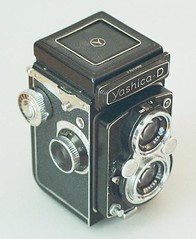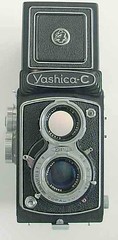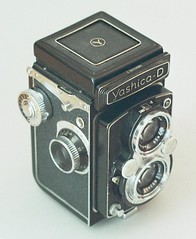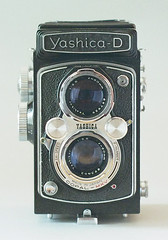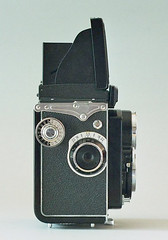Difference between revisions of "Yashica 6×6 TLR (knob advance)"
Rebollo fr (talk | contribs) (reorganizing the Yashica TLR pages, importing stuff from scattered articles) |
Rebollo fr (talk | contribs) (imported the Yashica-635 page) |
||
| Line 38: | Line 38: | ||
== The Yashica-E == | == The Yashica-E == | ||
| + | The '''Yashica-E''' was an attempt by [[Yashica]] in 1964 to make a [[TLR]] as simple to use as a P&S. Single shutter speed (1/60) with the [[f-stop]] automatically set by the built in [[selenium]] [[light meter]]. Wind on is semi-automatic and there's even a built in flash that takes peanut flash bulbs hidden behind the E's name plate. | ||
| − | The '''Yashica- | + | == The Yashica-635 == |
| + | The '''Yashica-635''' is basically a [[#The Yashica-D|Yashica-D]] with the added ability to use 35mm film as an alternative to 120. To use 35mm requires an adaptor kit. Novelty aside, the purpose of using 35mm in a 6x6 format TLR is unclear. It seems that you get all the disadvantages of the TLR format (parallax, reversed viewfinder for framing, slow use) without the number-one advantage of the format, the huge film size. | ||
| + | |||
| + | I would add the following: I have an early 635 which was updated from Yashikor to Yashinon lenses by Mark Hama. It does a fine job shooting 120 and produces sharp negitives. The standard 80mm lends itself well for landscape or architecture but lacks focal length needed for portraits. However, when loaded with 35mm the 80mm lens is ideal for portraits. I consider it far more than a "Novelty". It is two great cameras in one. | ||
| + | Among collectors, the 635 is a little more desirable than the D but the 635 can still be found for less than $100 (sometimes less than $50). At these prices the D and the 635 are great alternatives to the overpriced Chinese TLRs still available new today. | ||
| + | |||
== Links == | == Links == | ||
=== General links === | === General links === | ||
| Line 48: | Line 54: | ||
* [http://medfmt.8k.com/mf/yashicaa.html Yashica-A], [http://medfmt.8k.com/mf/yashicac.html Yashica-C], [http://medfmt.8k.com/mf/yashicad.html Yashica-D] and [http://medfmt.8k.com/mf/kb/yashica_e.html Yashica-E] at the [http://medfmt.8k.com/ Medium Format Photography Megasite] | * [http://medfmt.8k.com/mf/yashicaa.html Yashica-A], [http://medfmt.8k.com/mf/yashicac.html Yashica-C], [http://medfmt.8k.com/mf/yashicad.html Yashica-D] and [http://medfmt.8k.com/mf/kb/yashica_e.html Yashica-E] at the [http://medfmt.8k.com/ Medium Format Photography Megasite] | ||
* [http://www.williamsphotographic.com/yashica.html Yashica TLR FAQ] in [http://www.williamsphotographic.com/cambuy.html Peter Williams' site] | * [http://www.williamsphotographic.com/yashica.html Yashica TLR FAQ] in [http://www.williamsphotographic.com/cambuy.html Peter Williams' site] | ||
| + | * [http://cameras.alfredklomp.com/yashica635/ Yashica-635] in [http://cameras.alfredklomp.com/ Alfred's Camera Page] | ||
| + | * [http://www.kyphoto.com/classics/yashica635.html Yashica-635] at [http://www.kyphoto.com/classics/ Favorite Classics] | ||
In French: | In French: | ||
* [http://35mm-compact.com/anciens/yashica-tlr.htm Yashica TLR overview] and [http://35mm-compact.com/mf/yashicaa.htm Yashica-A] at Lionel's [http://35mm-compact.com/ 35mm-compact.com] | * [http://35mm-compact.com/anciens/yashica-tlr.htm Yashica TLR overview] and [http://35mm-compact.com/mf/yashicaa.htm Yashica-A] at Lionel's [http://35mm-compact.com/ 35mm-compact.com] | ||
| + | * [http://www.theothermartintaylor.com/moveabletype/archives/cameras/000196.html Yashica-635] at [http://www.theothermartintaylor.com/ the Other Martin Taylor's website] | ||
In Japanese: | In Japanese: | ||
* [http://www.geocities.jp/je2luz/yashicaadcamera.htm Yashica-A and Yashica-D] at [http://www.geocities.jp/je2luz/ je2luz] | * [http://www.geocities.jp/je2luz/yashicaadcamera.htm Yashica-A and Yashica-D] at [http://www.geocities.jp/je2luz/ je2luz] | ||
| Line 55: | Line 64: | ||
=== Original documentation === | === Original documentation === | ||
* [http://www.flickr.com/photos/goodharbor/sets/1359526/ Yashica leaflet] (#72E1) dated 1972, featuring the Yashica-635 and Yashica-D along with [[Yashica 6×6 TLR (crank advance)|crank advance models]] | * [http://www.flickr.com/photos/goodharbor/sets/1359526/ Yashica leaflet] (#72E1) dated 1972, featuring the Yashica-635 and Yashica-D along with [[Yashica 6×6 TLR (crank advance)|crank advance models]] | ||
| + | * [http://www.kyphoto.com/classics/instructionmanuals.html Manual of the Yashica-635] available on the [http://www.kyphoto.com/classics/ Favorite Classics section of .kyphoto.com] | ||
| + | * [http://www.butkus.org/chinon/yashica_635/yashica_635.htm Manual of the Yashica-635] available at [http://www.butkus.org/chinon/ butkus.org] | ||
[[Category: Japanese 6x6 TLR]] | [[Category: Japanese 6x6 TLR]] | ||
[[Category: Yashica]] | [[Category: Yashica]] | ||
[[Category: Y]] | [[Category: Y]] | ||
Revision as of 17:53, 21 September 2007
Contents
The Yashica-A
The Yashica-A is a medium format TLR made by Yashica. It features twin Yashikor 80mm f/3.5 lenses, and makes a 6cm x 6cm photo on 120 roll film. It has a Copal shutter, with shutter speeds of 1/25, 1/50, 1/100, and 1/300. It has a PC connection for flash sync, and because it uses a leaf shutter, it is capable of X sync at all shutter speeds.
Operation
Shutter speed is selected by rotating the shutter speed dial. Aperture is set by adjusting a lever on the outside of the shutter speed dial. Film advance is performed by manually cranking the advance wheel until the next frame number appears in the red window on the back of the camera.
The Yashica-C
The Yashica-C is a medium format TLR made by Yashica. It makes a 6cm × 6cm photo on 120 roll film. It has a PC connector for flash sync, and because it uses a leaf shutter, it is capable of X sync at all shutter speeds.
The Yashica-D
The Yashica-D is a medium format TLR camera produced by Yashica in Japan. Early models were equipped with a coated three-element Yashikor 80mm f3.5 taking lens, while later models had the higher-quality, four-element Yashinon 80mm f3.5 taking lens. Early models had a Yashikor 80mm f3.5 viewing lens, while later models had a Yashinon 80mm f3.2 viewing lens. The last Yashica D models were equipped with bright 80mm f2.8 Yashinon viewing lenses; models with this viewing lens and the Yashinon taking lens are very desirable on the used market.
The camera makes a 6×6 photo on 120 roll film, and has a Copal shutter, with shutter speeds of 1 – 1/500. It provides a PC connector for flash sync; and because it uses a leaf shutter it is capable of X sync at all shutter speeds. Be sure to set the flash switch to the "X" position when using an electronic flash. The M setting is only used for flash bulbs (now hard to find).
The taking lens accepts Bay I filters and hoods. Use a hood to prevent flare.
Operation
Shutter speed and aperture are set by turning small dials on the front of the camera just above the taking lens until the appropriate number appears in a window on the top of the viewing lens. Film is advanced by manually cranking the advance wheel until it stops turning. A small frame counter is visible on the side of the camera near the film advance knob.
Since the camera does not have a light meter, use a hand-held light meter or the sunny-16 rule.
Use of a cable release requires a Leica nipple.
The Yashica-E
The Yashica-E was an attempt by Yashica in 1964 to make a TLR as simple to use as a P&S. Single shutter speed (1/60) with the f-stop automatically set by the built in selenium light meter. Wind on is semi-automatic and there's even a built in flash that takes peanut flash bulbs hidden behind the E's name plate.
The Yashica-635
The Yashica-635 is basically a Yashica-D with the added ability to use 35mm film as an alternative to 120. To use 35mm requires an adaptor kit. Novelty aside, the purpose of using 35mm in a 6x6 format TLR is unclear. It seems that you get all the disadvantages of the TLR format (parallax, reversed viewfinder for framing, slow use) without the number-one advantage of the format, the huge film size.
I would add the following: I have an early 635 which was updated from Yashikor to Yashinon lenses by Mark Hama. It does a fine job shooting 120 and produces sharp negitives. The standard 80mm lends itself well for landscape or architecture but lacks focal length needed for portraits. However, when loaded with 35mm the 80mm lens is ideal for portraits. I consider it far more than a "Novelty". It is two great cameras in one.
Among collectors, the 635 is a little more desirable than the D but the 635 can still be found for less than $100 (sometimes less than $50). At these prices the D and the 635 are great alternatives to the overpriced Chinese TLRs still available new today.
Links
General links
In English:
- Yashica-D (Yashikor model) in Matt Denton's camera site
- Yashica TLRs at Barry Toogood's tlr-cameras.com
- Yashica-A, Yashica-C, Yashica-D and Yashica-E at the Medium Format Photography Megasite
- Yashica TLR FAQ in Peter Williams' site
- Yashica-635 in Alfred's Camera Page
- Yashica-635 at Favorite Classics
In French:
- Yashica TLR overview and Yashica-A at Lionel's 35mm-compact.com
- Yashica-635 at the Other Martin Taylor's website
In Japanese:
Original documentation
- Yashica leaflet (#72E1) dated 1972, featuring the Yashica-635 and Yashica-D along with crank advance models
- Manual of the Yashica-635 available on the Favorite Classics section of .kyphoto.com
- Manual of the Yashica-635 available at butkus.org
